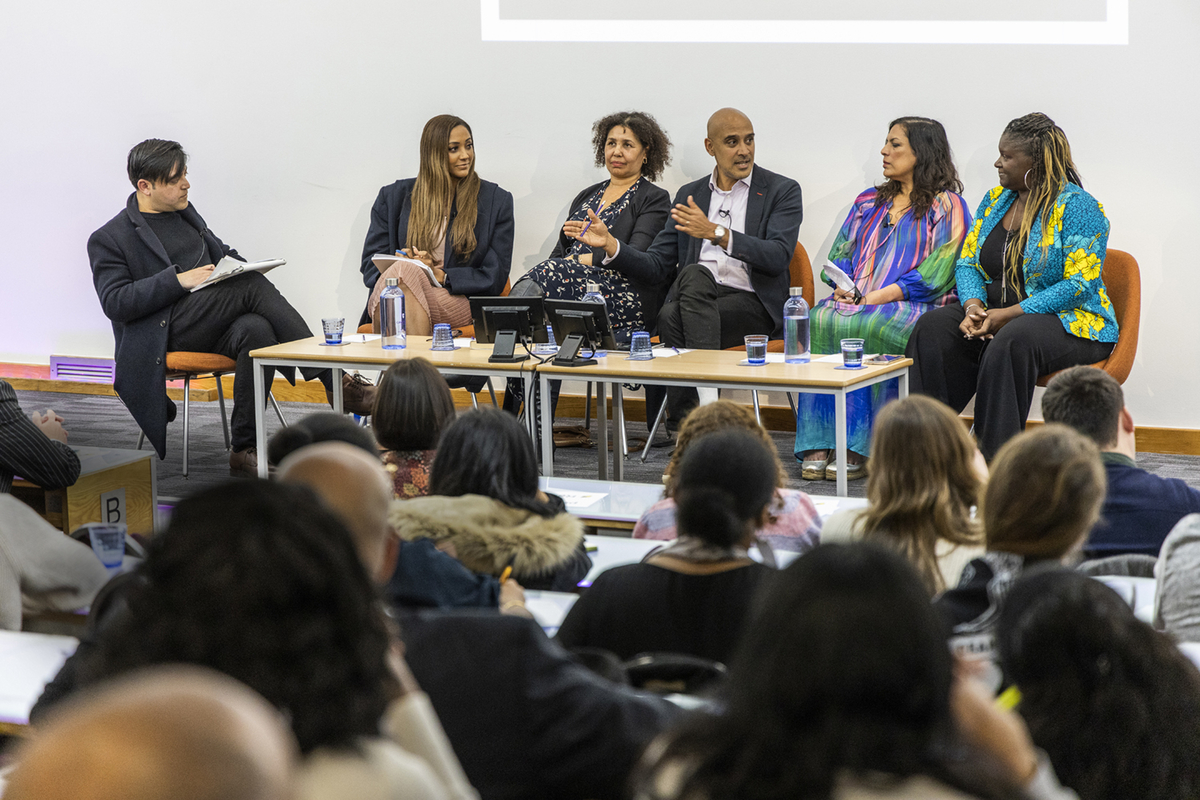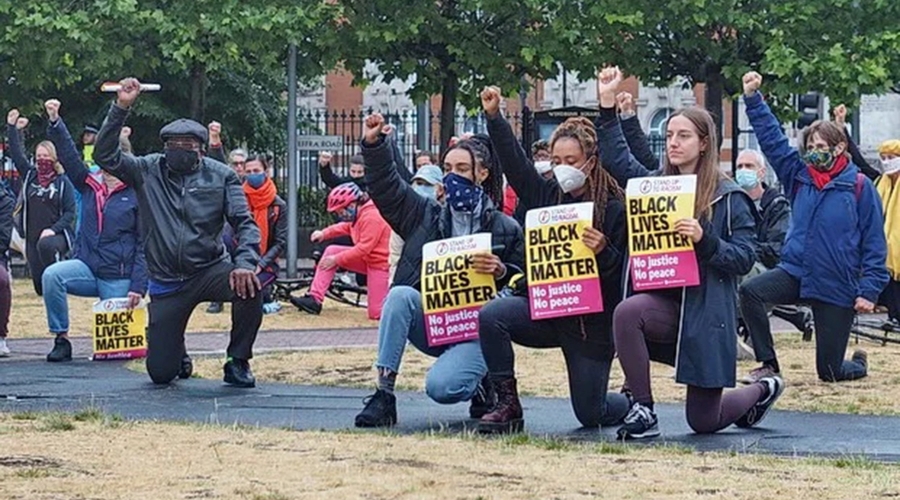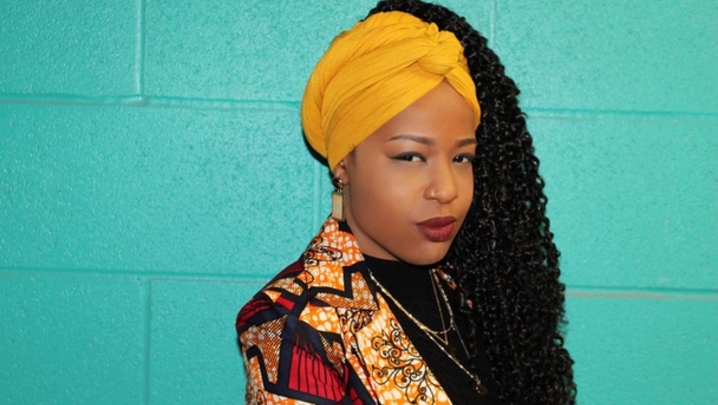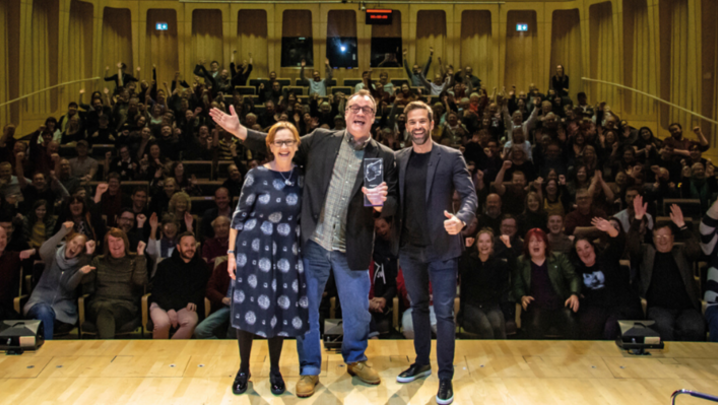Three years after the murder of George Floyd, an RTS National Event examines the impact on programming and commissioning.
After the murder of George Floyd in 2020, many companies worldwide issued statements of solidarity and support, and posted black squares on their websites and social media feeds. In the UK, the movement galvanised the TV industry. Broadcasters took stock of the sometimes paltry proportion of their output they were commissioning from black people. ITV announced a Diversity Acceleration Plan while Sky pledged £30m to support anti-racism and improve diversity and inclusion. As a result, there was an uplift in demand for diverse talent, on-screen and behind the camera.
Weeks after the killing, Channel 4 made a new, six-point commitment to an anti-racist agenda, while the BBC announced a three-year, £112m fund for diverse and inclusive content.
But in the three years since Floyd’s death and these promises, what has been delivered and what may be to come? This question was at the heart of the RTS discussion “Legacy of the black square”, chaired by K Biswas, editor of Representology: The Journal of Media and Diversity. The panel featured speakers from the BBC, Channel 4 and Amazon, alongside Marcus Ryder, head of external consultancies at the Lenny Henry Centre for Media Diversity, and Lucy Pilkington, Managing Director of Milk and Honey Productions.
“The reason this whole process started was because a black man lost his life in really tragic circumstances,” said Pilkington. “I think we sometimes forget that this was a response to ‘How can this happen in America now, in this day and age?”
After Floyd’s murder, she said: “My phone was ringing obscenely quickly.... In the short term, lots of black producers were working who weren’t working a few years ago.” But, she cautioned, this needs to be viewed in the context of a long drift away from caring about minorities and black people that commissioners and producers are trying to redress. “We are tasked with a job to tell the stories of people who can’t tell their own,” she said.
Some of the new demand came from Channel 4’s Black to Front initiative, a complete takeover of its scheduled programming for 24 hours by black broadcasting talent. The project, which took place in September 2021, was led by the channel’s head of specialist factual, Shaminder Nahal, and fellow commissioning editor, factual entertainment, Vivienne Molokwu.
“We were trying to think about something of scale that had legacy, to force people to think about what was happening and to reimagine our channel output,” said Nahal. “It allowed us to shift the dial a little bit.”
The Black to Front project took 16 months to come to the screen. More immediate was Channel 4’s commitment to be an anti-racist organisation. Floyd died on 25 May 2020; Channel 4’s six-point pledge was delivered two weeks later.
Ryder reminded the audience that, although Channel 4’s licence requirements were relaxed in 2003, in 2020 the broadcaster found itself under threat of privatisation. “In many ways, it found its boldness again,” he suggested.
However, he then took the channel to task on its delivery of various elements of that six-point commitment. As an anti-racist organisation, Ryder suggested it should support the independent racism monitoring proposals put forward by the media union Bectu.
He also suggested that its commitment to increase the commissioning of “relevant and authentic content” lacked key performance indicators and might benefit from an industry test, along the lines of the Bechdel Test for representation of women in fiction.
Answering these points, Nahal pointed to the broadcaster’s work to ensure diversity, including consultation with the Lenny Henry Centre to reassess the channel’s position a year on from Black to Front. “We appreciate the challenge and scrutiny, it’s important to keep analysing,” said Nahal. “The only way we are going to make a difference is by never becoming complacent.”
The BBC’s head of creative diversity, Joanna Abeyie, defended the scope of the corporation’s £100m commissioning fund, which she described as “a floor of investment, not a ceiling.”
In response to concerns from panellists that the fund was too widely defined and lacked precise measurement and accountability, Abeyie said that an audit system had been in place since its inception, allowing for a rolling evaluation.
There are three core criteria: diverse stories and portrayal on screen; diverse production leadership; and diverse company leadership. “We realise there is space for improvement,” said Abeyie. “But it has shown us how we are spending and told us what our portrayal is looking like, as well as production talent.”
The BBC’s wider three-year Diversity and Inclusion Plan was published in February 2021 and is being revisited for 2024 and beyond, with input from external organisations, including the Lenny Henry Centre. It will be “full of measurements”, promised Abeyie.

Ryder drew comparison between a commitment to fund diverse and inclusive commissioning and a commitment to fund national production in Scotland, with the definition of Scottish production being relatively straightforward. “One of the problems of the legacy of the black square is it was meant to be a response to anti-black racism and quickly morphed into addressing prejudice and bigotry in general,” he said. “If there should be a legacy, it should be that black lives matter.”
At Channel 4, executives no longer refer to Bame (black, Asian and minority ethnic people) and talk less about diversity in general, said Nahal. “One of the legacies is that we have to talk about what we mean more clearly.” The channel now ensures that every genre has a black-owned and an Asian-owned production company on its slate.
In 2021, the organisation committed to tripling its spend with ethnically diverse-led indies by the end of 2023.
After Black to Front, Channel 4 rewrote its commissioning guidelines to include the need for a senior figure in a production company to be from a diverse background. “We now have to have that conversation with the production company,” said Nahal.
Miranda Wayland, now head of international diversity, equity, inclusion and accessibility, content and strategy for Prime and Amazon Studios, took the discussion back to 2020, when she was at the BBC. “The entire industry in the UK and internationally started to deep dive into its portfolios,” she remembered.
“[Companies] found that the content spoke to stereotypes and tropes no longer acceptable and tried to make themselves accountable.” In many places they woke up to a wealth of talent and an audience that, historically, had not been considered.
Amazon has also been addressing commercial opportunities as it expands in the African market, with Prime Video now having dedicated country teams for Nigeria and South Africa, as well as several partnerships with African TV and film organisations. After Floyd’s death, it doubled down on US content, with shows such as One Night in Miami and Harlem. “Our customers hadn’t seen black stories in that way,” said Wayland.
“We’re talking about racial equity and understanding the financial rhythm that sits behind that, from development to green light, having intentional, authentic conversations,” she said. “In production and creative environments, we want to create psychologically safe spaces so that black talent can do their best work.”
For Pilkington, as an independent producer, the need to understand the specific opportunity, to make plans and build a production business with returnable shows requires a changing of the guard. “You need black executives making decisions about not only what black people are going to watch, but white people as well,” she said. “Of course, audiences will come to black stories and black heroes, but you’ve got to get behind it.… We need to have more confidence in black stories.”
Report by Pippa Considine. ‘Legacy of the Black Square’ was an RTS National Event held at the Cavendish Conference Centre in central London on 26 April. The producer was Angela Ferreira.




